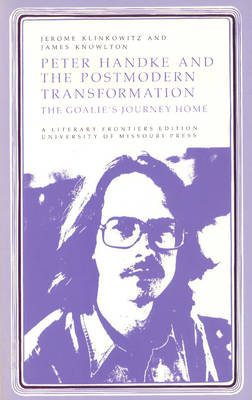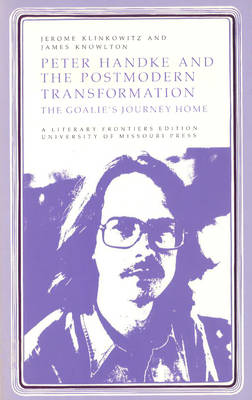
- Retrait gratuit dans votre magasin Club
- 7.000.000 titres dans notre catalogue
- Payer en toute sécurité
- Toujours un magasin près de chez vous
- Retrait gratuit dans votre magasin Club
- 7.000.0000 titres dans notre catalogue
- Payer en toute sécurité
- Toujours un magasin près de chez vous
Peter Handke and the Postmodern Transformation, 1
The Goalie's Journey Home
Jerome Klinkowitz, James KnowltonDescription
In 1966, Peter Handke disturbed the world of German letters with the publication of his first novel and with his attacks on the complacency of German-language writers and their audiences. Since then, Handke--an Austrian whose works include drama, poetry, and critical theory as well as fiction--has become a leading European figure in the internationally established postmodern movement.
Klinkowitz and Knowlton survey Handke's progress as a writer, concentrating on his novels, to determine whether his creativity has been exhausted by his persistent assault on the systems that underlie conventional fiction, drama, and poetry. By placing Handke's work in the tradition of Gabriel García Márquez's magic realism and Donald Barthelme's innovative fictions, the authors demonstrate that postmodern writers can create works of art in which content is effaced and the process of composition assumes increasing importance. Indeed, in so doing, Handke has made that process as humanly interesting and as fictionally dramatic as any stories of The Great Tradition: he has learned to address the human condition within the limits of a rebellious aesthetic. The lesson of the postmodern transformation, Klinkowitz and Knowlton argue, is that the abstraction of content is not a loss; instead, it leads directly to the most essential human concerns.
Spécifications
Parties prenantes
- Auteur(s) :
- Editeur:
Contenu
- Nombre de pages :
- 144
- Langue:
- Anglais
- Collection :
Caractéristiques
- EAN:
- 9780826204202
- Date de parution :
- 01-12-83
- Format:
- Livre broché
- Format numérique:
- Trade paperback (VS)
- Dimensions :
- 127 mm x 203 mm

Les avis
Nous publions uniquement les avis qui respectent les conditions requises. Consultez nos conditions pour les avis.






